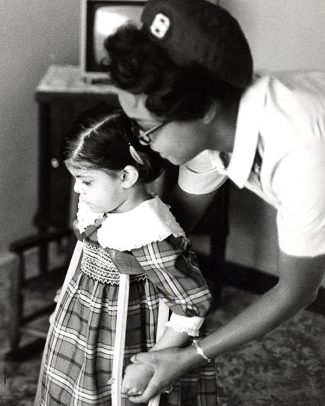Black nursing history project awarded funding
By Deborah Ziff Soriano
The Midwest Nursing History Research Center at the UIC College of Nursing earned a grant from the Chicago-based Gaylord and Dorothy Donnelly Foundation to create the Chicago Black Nurses Archive Mapping project, a publicly accessible, Black-centered history of nursing in Chicago.
The grant, awarded to the nursing history center’s director Gwyneth Milbrath, is part of the Donnelly Foundation’s “Broadening Narratives” initiative, which aims to fund specific collections projects that bring forward underrepresented stories. Karen Flynn, an associate professor in the departments of Gender & Women’s Studies and African American Studies at the University of Illinois Urbana-Champaign, is a co-primary investigator on the project.
“This project marks a pivotal moment as we work to recognize and celebrate Black nursing history, revealing narratives of Chicago’s Black nurses not only during crisis points in American history such as the Civil Rights movement or the HIV/AIDS crisis, but also in the current climate,” Milbrath said.
The project will promote existing archival collections, conduct oral interviews with working and retired Black nurses, and create mobile and digital exhibits highlighting their work in Chicago over the past 130 years. The center will work closely with the Black Metropolitan Research Consortium to identify various archives across the city that contain records related to Black nurses in Chicago.
Milbrath and Flynn were also recently awarded $175,000 in funding from the University of Illinois System’s Presidential Initiative for “Remembering Black Life in Color: Care, Memory, Community and COVID-19,” a project to assemble the history of how the COVID-19 pandemic has affected Black communities in Chicago.
The $60,000 Donnelly Foundation grant to UIC Nursing was one of 10 awarded in Chicago and Lowcountry of South Carolina. All of the funded projects illustrate BIPOC (Black, indigenous and other people of color) communities, LGBTQ+ perspectives, working-class narratives, small community experiences, as well as other underrepresented groups and viewpoints.
“While the purpose of collections is to ensure that stories are preserved, many narratives are often overlooked because of decisions based on race, gender, sexual identity, educational background, economic or social status, or because they are perceived to be outside the conventional thinking of the day,” said David Farren, executive director of the Donnelly Foundation. “We are thrilled to announce these grant recipients and want to thank these organizations for being part of this new way forward in collections thinking that shifts focus from the processing of material objects to the telling of broader and more inclusive narratives.”

